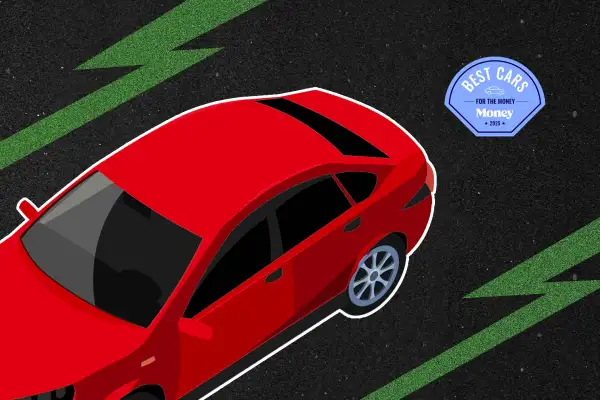The Best Electric Cars of 2025

Once upon a time, the Nissan Leaf stood alone as the only electric car an environmentally-minded shopper could buy. Now the market is teeming with options and adding new models from a swath of manufacturers every month.
As a result, prices are coming down while battery range is going up. Today’s best electric cars can travel more than 300 miles before needing to recharge — enough to drive from Los Angeles to Las Vegas without stopping.
Performance is also improving, with quicker acceleration and smooth, precise handling. If you’re accustomed to driving gas-engine cars, you’ll discover that EVs are much quieter, creating a more comfortable experience for passengers in the cabin.
After driving and comparing dozens of electric cars, following our step-by-step methodology, we picked seven that stood out from the pack. We picked the cars with the best combination of price, impressive battery range, strong performance and features, along with some other considerations, such as reliability and depreciation.
Below are those picks, along with their pros, cons and drive range on an electric charge.
(If you’re interested in a broader look at the new vehicle marketplace, check out our full list of the Best Cars of 2025.)
Best Electric Cars of 2025
Best Overall: Hyundai Ioniq 6
Best for Performance: Tesla Model 3
Best for Luxury: Polestar 2
Best for Affordability: Nissan LEAF
Best Value: Nissan Ariya
Best for Comfort: Volkswagen ID.4
Best for Versatility: Kia Niro
Best Overall: Hyundai Ioniq 6
- Price: $37,750
- Driving range on a full charge: 240 miles
- Standout safety rating
- Excellent warranty
- Small trunk
The 2025 Hyundai Ioniq 6 is the total package: best-in-class range (albeit with a pricey upgrade), engaging driving dynamics and a cabin chock full of standard features. Those features include a 12.3-inch touch screen infotainment system and some extra niceties like heated front seats.
The base (Standard SE) model has a 240-mile range. While that’s adequate for a 2025 EV, some competitors offer more. To unlock the Ioniq 6’s best range, a standout 342 miles, you’ll need to upgrade to the $42,700 SE trim. (That’s a couple thousand dollars less than the starting price of the Tesla Model 3 Long Range edition.)
The Ioniq 6 is the only pick in this category that was tested and earned the accolade of Top Safety Pick + – the highest awarded – from the Insurance Institute for Highway Safety (IIHS).
Importantly for first-time EV buyers looking for peace of mind as they move to a new technology, the Ioniq 6 is backed by one of the best warranties of any model on this list.
It includes a five-year/60,000-mile limited warranty along with a 10-year/100,000-mile warranty for its battery and EV powertrain components.
The main drawback to the Ioniq 6 is that it offers less cargo space than other EVs, with a trunk only large enough to fit a charging cable.
Best for Performance: Tesla Model 3
- Price: $44,130
- Driving range on a full charge: 363 miles
- Impressive performance
- User-friendly charging network
- Distracting infotainment screen
The Tesla Model 3 underwent a facelift for 2024, addressing complaints about its minimalist cabin and complicated infotainment system. Now the spartan interior sports some nicer trim pieces such as thicker padding on the doors and a new cloth upholstery, although we still find the infotainment screen to be somewhat distracting.
But the interior is not the main reason you buy a Model 3. You buy it for the class-leading performance (notably in acceleration), long range and unmatched charging network. The latter boasts more remote fast-charging stations than any other brand, and offers the ability to add about 248 miles of power within 30 minutes.
The Long Range base model cruises from 0 to 60 mph in an impressive 4.2 seconds. Meanwhile, the $56,630 Performance model is even quicker, shaving a full second off the journey. However, that extra performance will cost you in range. The Performance delivers just 303 miles compared to the base model’s 363-mile range.
Starting at $44,130, the Model 3 is among the priciest of our picks. It has, however, held its value especially well. It was recently named the best premium electric car in the 2025 JD Power Residual Value Awards, which recognize vehicles that have depreciated the least in recent years.
Best for Luxury: Polestar 2
- Price: $49,900
- Driving range on a full charge: 320 miles
- Impressive range
- Powerful performance
- Very expensive
The Polestar 2 electric sedan has increased its entry-level range to 320 miles, putting it in the big leagues alongside Hyundai and Tesla. The base model, which also gets 69 additional horsepower for breezy acceleration, starts at $49,900. That’s the most expensive model on our list of electric cars but considered reasonable for the luxury space where Polestar wants to play.
The interior feels suitably upscale, albeit erring on the minimalist side with the Tesla Model S, with a 12.3-inch digital gauge cluster and an 11.2-inch touch screen to control navigation and other functions. Leather upholstery with ventilated front seats will set you back $4,000, so we recommend sticking with the base model’s textile upholstery from its Volvo parent’s bank of sustainable and recycled materials.
Best for Affordability: Nissan LEAF
- Price: $28,140
- Driving range on a full charge:149 miles
- Affordable starting price
- Practical EV for commuters
- Ho-hum range and ride quality
The Nissan LEAF has fallen behind in the segment it pioneered. Once the world’s only electric car, it has lost its spirit of innovation, instead becoming a practical daily driver distinguished by its similarity to a regular sedan.
That leaves the remaining upside of the modern LEAF as its price: $28,140 for the base model. But you’ll need to make serious sacrifices to save at least $10,000 or so over any other of our picks.
The LEAF’s ride is less than thrilling and its range is a ho-hum 149 miles, which is at least 100 miles fewer than most of its rivals deliver. Further, having less battery capacity (reflected in that range) means the LEAF takes much longer to charge than its rivals. If you’re using a Level 1 charger, the kind many owners have in their garage, that means days of charging, rather than hours.
The upshot: choose this budget EV only if you will drive it only locally and aren’t fussy about performance.
Best Value: Nissan Ariya
- Price: $39,770
- Driving range on a full charge: 216 miles
- Well-equipped for the money
- Moderately priced compared with some competitors
- Ho-hum driving experience, especially in the base model
- Range is only OK, especially in the base model
The Nissan Ariya starts at just below $40,000, solidly in the middle of the pack for an EV of its size. With a front-wheel drive, single-motor powertrain and 66-kWh battery, the standard Engage trim can travel 216 miles when fully charged. It also comes with heated front seats and synthetic leather upholstery – niceties you don’t always find in a base model.
However, there’s nothing especially exciting about driving the Ariya, especially in its base models. We recommend upgrading to the Ariya’s $44,000 Evolve+ trim. Its 91-kWh long-range battery can travel up to 289 miles on a full charge, which should provide sufficient margin to get you through an average American week of commuting.
Best for Comfort: Volkswagen ID.4
- Price: $39,735
- Driving range on a full charge: 206 miles
- Very quiet, comfortable cabin
- Tall ride height for easy entry and exit
- Range for the base model is below par
Almost exactly the same price as the Nissan Ariya and Kia Niro, the Volkswagen ID.4 boasts an airy, near-silent cabin that prioritizes comfort. Its taller ride height provides an unusual amount of headroom, which means you and your passengers can enter and exit the electric crossover with minimal hassle.
The base model delivers a smooth ride of up to 206 miles on a full charge. That’s below average for the class. Rear-wheel-drive models with the larger 82-kWh battery can travel up to 263 miles.
A 12.9-inch touch screen dominates the spacious cabin. All models also come with Android Auto, Apple CarPlay, wireless device charging and four USB ports.
Best for Versatility: Kia Niro
- Price: $39,600
- Driving range on a full charge: 253 miles
- Great range for the money
- Also available in hybrid and plug-in hybrid versions
- Slower to charge than some other Kia EVs
Kia’s versatile Niro is available as a hybrid, plug-in hybrid or fully electric subcompact crossover. Starting just below $40,000, its cutely-named Wind and Wave trims each come with a 64.8-kWh battery that can travel up to 253 miles when fully charged. Pitted on the price-range matrix, that makes the Niro the Goldilocks of EVs. Its long list of safety features may sweeten the deal.
Like all other Kias, the Niro EV is covered by the factory’s class-leading five-year/60,000-mile limited warranty along with a 10-year/100,000-mile warranty for its battery and EV powertrain components, which could give first-time EV buyers peace of mind.





